Thank you for visiting nature.com. You are using a browser version with limited support for CSS. To obtain the best experience, we recommend you use a more up to date browser (or turn off compatibility mode in Internet Explorer). In the meantime, to ensure continued support, we are displaying the site without styles and JavaScript.
- View all journals

Marine biology articles from across Nature Portfolio
Marine biology is the study of life in the oceans and brackish waters, which ranges from archaea and bacteria to marine mammals, and includes organisms such as corals that affect the shape of the seafloor. This may also include human modifications to ocean biology, such as fisheries or the effects of overfishing.
Latest Research and Reviews
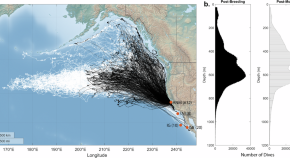
Two decades of three-dimensional movement data from adult female northern elephant seals
- Daniel P. Costa
- Rachel R. Holser
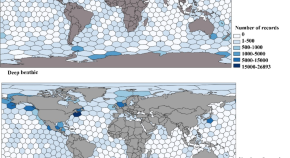
Exploring latitudinal gradients and environmental drivers of amphipod biodiversity patterns regarding depth and habitat variations
- Farzaneh Momtazi
- Hanieh Saeedi
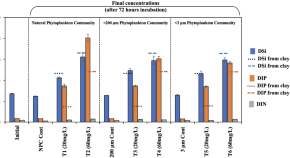
Organoclay flocculation as a pathway to export carbon from the sea surface
- Diksha Sharma
- Vignesh Gokuladas Menon
- Mukul Sharma
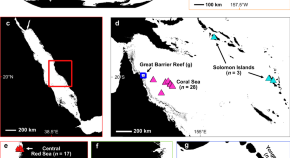
Calcification trends in long-lived corals across the Indo-Pacific during the industrial era
Calcification rates of reef-building corals have decreased across the Indo-Pacific since 1900 due to recent marine heatwaves, according to analyses of coral core samples.
- Thomas M. DeCarlo
- Jordyn Cotton
- Kathleen Matthews
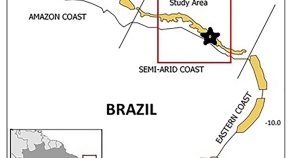
Depth drive shifts in the fish and benthic assemblages of the South American Reef System
- Rhayany Juvêncio Costa
- Pedro Bastos de Macedo Carneiro
- Marcelo O. Soares
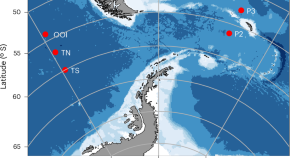
Inefficient transfer of diatoms through the subpolar Southern Ocean twilight zone
Diatom skeletons largely remain near the surface of the subpolar Southern Ocean following diatom bloom events, suggesting that they do not play as big a role in the downward flux of organic matter as previously thought, according to data from two expeditions focused on the marine twilight zone.
- J. R. Williams
- S. L. C. Giering
- A. P. Martin
News and Comment
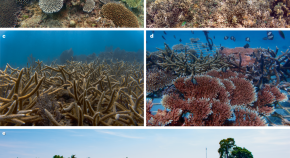
The critical role of coral reef restoration in a changing world
Recent discussions have raised concerns about the long-term effectiveness of coral reef restoration efforts, questioning whether current interventions can effectively address the ongoing loss of reef ecosystems. However, details matter and vary greatly with respect to scale, social context and benefits, and diverse approaches are needed to maintain functional coral reef ecosystems.
- Raquel S. Peixoto
- Christian R. Voolstra
- David J. Suggett

Solid phase extraction to measure B-vitamins in aquatic systems
Meriel Bittner explains how solid phase extraction can be used to concentrate B-vitamins for quantification in aquatic systems.
- Meriel J. Bittner

Multiscale incubations to investigate microalgal dynamics
Simon Jaffrès explains how multiscale incubations help reveal marine microalgal responses to environmental change
- Simon P. H. Jaffrès
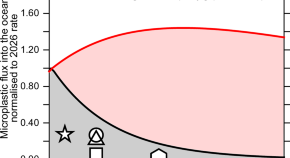
Mind the fragmentation gap
The Global Plastics Treaty presents an opportunity to “end plastic pollution”. Legacy plastics will continue to fragment to secondary microplastics for decades, without additional mitigation measures. We identify this flux as a “fragmentation gap”, currently overlooked in global policy targets.
- Karin Kvale
- Zhenna Azimrayat Andrews
- Matthias Egger

Shipboard microcosms help explore changing ocean dynamics
Laurence Bisson explains how shipboard microcosms can be used to monitor microbial responses to changing ocean dynamics.
- Laurence Bisson

Challenges in developing STEM sign language for inclusive education
Caroline Solomon is a biological oceanographer and deaf. She discusses how STEM sign lexicon development contributes to inclusive education and which challenges still need to be overcome.
- Caroline M. Solomon
Quick links
- Explore articles by subject
- Guide to authors
- Editorial policies
Research Topics
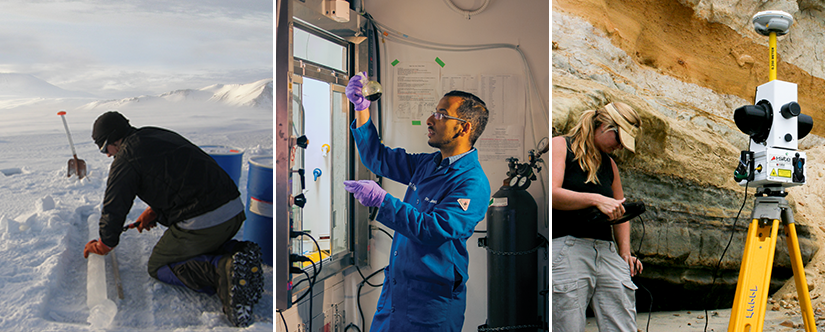
Scripps Oceanography researchers work in a variety of fields in biology, earth science, and oceans and atmospheric science. Select any of the topics below for a sampling of researchers in that field, labs and centers associated with the topic, and news stories about the work.
- Biological Impacts of Climate Change
- Chemical Ecology
- Coastal Ecology
- Conservation Ecology
- Coral Reef Biology and Ecology
- Deep-Sea Biology
- Developmental Biology of Marine Organisms
- Ecosystem Dynamics and Theory
- Environmental Toxicology
- Fisheries Biology and Management
- Genomics, Metagenomics, and Bioinformatics
- Invertebrate Zoology and Parasitology
- Life History Strategies and Behaviors
- Marine Benthic Ecology
- Marine Chemical Biology and Biotechnology
- Marine Mammal Biology
- Marine Microbiology
- Natural Products Chemistry
- Phylogenetics, Systematics and Biogeography
- Physiology of Marine Organisms
- Phytoplankton Biology and Algal Biofuels
- Plankton Ecology and Food-Web Interactions
- Polar Ecology
- Population and Community Ecology
- Population Genetics and Evolutionary Biology
- Acoustics and Infrasound
- Archaeology
- Biogeochemistry
- Coastal Processes
- Cryosphere and Polar Science
- Electromagnetism
- Geodesy and Lithospheric Deformation
- Geodynamics
- Geomagnetism, Paleomagnetism
- Geomorphology
- High Temperature Geochemistry
- Hydrogeology
- Instrumentation and Observational Networks
- Isotopic Geochemistry
- Low Temperature Geochemistry
- Marine, Atmospheric, and Aqueous Tracers
- Marine Chemistry
- Marine Geology and Geophysics
- Mathematical and Theoretical Geophysics
- Planetary Sciences and Meteoritics
- Numerical Modeling
- Paleoceanography and Paleoecology
- Remote Sensing
- Sedimentary Processes
- Seismology and Earthquake Physics
- Tectonics and Structural Geology
- Volcanology
- Applied Ocean Sciences
- Atmospheric Aerosols and Chemistry
- Autonomous Ocean Platforms and Global Observing Systems
- Biogeochemistry and Greenhouse Gases
- Climate Change and Health
- Climate Sciences
- Cloud Physics and Boundary Layer Processes
- Coastal Oceanography
- Environmental Justice
- Global Hydrography and Circulation
- Ice in the Climate System
- Internal Waves and Ocean Mixing
- Land Surface Hydrology
- Modeling and State Estimation of the Oceans, Atmosphere, and Climate
- Nearshore and Surf Zone Processes
- Nonlinear and Surface Waves
- Ocean Acidification
- Ocean Acoustics
- Ocean-Atmosphere Interactions
- Ocean Instrumentation and Technology
- Ocean Optics
- Past Climate Change
- Physical Oceanography
- Public Health and Epidemiology
- Remote Sensing and Satellite Oceanography
- Southern Ocean and High-Latitude Climate Studies
- Tropical Meteorology and Oceanography
- Upper Ocean and Submesoscale Processes
Sign Up For Explorations Now
- Ocean Topics Topics: 92
- Pollution Research Topics Topics: 231
- Deforestation Paper Topics Topics: 60
- Water Pollution Research Topics Topics: 54
- Climate Change Essay Topics Topics: 311
- Air Pollution Essay Topics Topics: 117
- Climate Essay Topics Topics: 239
- Global Warming Paper Topics Topics: 178
- Recycling Topics Topics: 122
- Biodiversity Paper Topics Topics: 58
- Environment Research Topics Topics: 469
- Ecosystem Essay Topics Topics: 71
- Earthquake Essay Topics Topics: 107
- Dump Research Topics Topics: 47
- Solar Energy Paper Topics Topics: 55
124 Marine Life Biology Topics
Want to explore marine life? The captivating world of oceans and seas is full of marine biology research questions. Here, find marine biology topics about an array of species and habitats, the balance of Earth’s environment, and invaluable resources to humanity. Get inspired by marine ecosystems and the challenges they face due to human activities. Let’s dive in!
🌊 TOP 7 Marine Biology Topics
🏆 best marine biology research questions, 🎓 interesting marine biology topics, 👍 catchy marine biology research topics, 💡 simple marine biology topics, ❓ more marine biology research questions.
- Rising Sea Levels: History, Causes and Effects
- North Sea and Baltic Sea Meeting Phenomenon
- Resolute Marine Energy: Power in Waves
- Chilean Sea Bass on the Menu and Its Impact on the Environment
- Ocean Research vs. Outer Space Exploration
- The WWF’s Environmental Advertisement on Marine and Ocean Pollution
- Description of the Pacific Ocean
- Floating Cities and Rising Sea Levels Global warming is an immense challenge in today’s society. The results of such an issue are the rising sea levels that make many communities flee their homes.
- Marine Transport System Efficiency Increasing The paper takes an in-depth look into the steps and measures that can be taken to enhance the efficiency of maritime transport. Such strategies can be used to avert the looming transport crisis.
- Rising Sea Levels: Solutions to Global Concern Global changes in climate have had tangible effects on numerous habitats and their biota. An increase in sea levels is one of the most infamous outcomes of global warming.
- Impact of Human Activities on Marine Ecosystems The main negative impact of human activities on these ecosystems is the drastic change in oxygen levels caused by industrial pollution.
- Marine Sediments Types: Lithogenous, Biogenous, Hydrogenous, and Cosmogenous Sediments Modern science determines four basic types of sediments. These are lithogenous, biogenous, hydrogenous, and cosmogenous. They all have unique characteristics that determine their structure.
- The Turtle-Headed Sea Snake’s Habitation Areas The paper aims to know the exact areas that turtle-headed sea snakes inhabit and quantify the number of such species within that vicinity.
- Sea Level Rise: Major Causes and Effects This paper includes a brief description of the major causes and effects of sea level rise, as well as measures people undertake to address the issue.
- The Problem of Ocean Pollution Today One of the main causes of the oceans being polluted is trash that includes various manufactured products like plastic bottles, shopping bags, food wrappers, and cigarettes.
- Earth Science: The Deep Sea This article discusses the importance of the marine environment to life on the planet and the need to study the impact of deep-sea mining on the marine environment.
- Marine Pollution: Causes and Consequences Changes in marine and ocean conditions can directly affect the global climate because of their close connection to the planet’s energy fluxes and biogeochemical cycles.
- Teleological Insight Into Army of Sea Urchins The teleological argumentative construct focuses on the relationship between the design and the creator akin to the apt performance across the sea’s natural environment.
- Marine Biology: Description and the Key Features Marine Biology is an open area of the coast line that is exposed to ocean currents and tides. This is a backwater area with occasional flooding of sea water.
- Twenty Thousand Leagues under the Sea: Captain Nemo’s Changes Captain Nemo is a sea researcher, inventor, and owner of the “Nautilus” submarine. This character is the embodiment of a true hero, courageous, decisive, and fair.
- Protection of Marine Environment Under International Law: Treaties and International Legal Instruments Laws touching on the protection of the marine environment have evolved. The evolution is made evident in this paper by analyzing the various international legal instruments.
- The Impact of Physical, Chemical, and Biological Agents on Marine Mammals The development of ecosystems is affected by various physical, biological, and chemical agents, and these effects can be both positive and negative.
- Analysis of Sea Lampreys Problem Sea lampreys reduce the fish population, which affects the livelihoods of people. They negatively influence economic activities such as tourism and fishing in lakes.
- History of Sea Navigation This paper includes a brief description of major milestones in the history of navigation starting from ancient times up to modern days.
- Saudi Marine Construction Projects and Risks The Saudi Arabian marine construction works revolve around the establishment of ports and harbors. The ports must be constructed to facilitate tourist arrival.
- Fiji’s Integrated Ocean Policy for Sustainable Blue Economy Examine Fiji’s approach to a sustainable blue economy through an integrated ocean policy, addressing challenges like overfishing and pollution.
- Plastic Crises in the Ocean and Effects on Marine Ecosystems The accumulation of plastic waste in the oceans causes physical damage to marine species and habitats, leading to the spread of invasive species and diseases.
- Impact of Human Behavior on Ocean and Ocean Acidification The paper states that the concentration of CO2 in the atmosphere has been increasing over the years due to human behavior and actions.
- The Ocean Clean Up Company’s Trial in Guatemala Ocean Clean Up has done an excellent job of creating the first scalable solution to efficiently intercept plastic in rivers before it reaches the oceans.
- Cyclone Asani in the North Indian Ocean Area Asani is the first cyclone to develop in the North Indian Ocean area of the Bay of Bengal and the Arabian Sea in 2022.
- Aquaculture: Second Chance for Marine Life
- How the Great Pacific Garbage Patch Affected Marine Life in the Surrounding Waters
- Marine Pollution and Its Effect on Marine Life
- Not Finding Nemo: How Climate Change Affects Marine Life
- Environmental Degradation: Primitive Organisms vs Modern Day Marine Life
- Marine Life and Its Systematic Evolution
- Human Impact Upon the Environment: Ocean Pollution and Marine Life
- Marine Life, Ocean Pollution, and Other Human Environmental Impacts
- How You Can Help Protect Marine Life While Diving
- Global Marine Life Affected by the Constant Rise of Water Temperature Due to Global Warming
- 10 Easy Ways to Help Protect Marine Life
- How the Plate Tectonics Theory Help Explains the Existence of Fossilized Marine Life in Rocks Atop the Ural Mountains
- Global Warming and Climate Change: Melting the Marine Life
- Understanding the Detrimental Effects of Harmful Algae in the Scientific Study of Marine Life
- The Alarming Danger Facing the Marine Life
- Humans’ Impact on Marine Life and What We Can Do to Stop Environmental Cataclysmic Effect
- How Water Pollution Affects Marine Life
- Marine Life: Environments and Marine Animals in the Deep Sea
- The Coral Reef Ecosystem: Marine Life and Surviving Underwater
- Mass Extinction, Human Impact, and Effects on Marine Life
- How Human Beings Have Destroyed Marine Life
- The Aral Sea Shrinking Process The Aral Sea is located in Central Asia, and it is a form of a large endorheic lake. The issue surrounding the given body of water is that it has been shrinking since the 1960s.
- The Importance of Marine Spatial Planning The paper states that improvements in marine spatial planning (MSP) can positively impact the economy, society, and the environment.
- The Climate Change Impact on Sea Levels and Coastal Zones This paper summarizes the effects of climate change on seawater levels and subsequent effects on the coastal zones.
- Dangers of Microplastics to Marine Ecosystems To reduce aquatic pollution and its impact, people should keep the environment clean by disposing wisely of the plastics they use.
- The Raising of Sea Levels in Lithuania This study will explore climate change in Lithuania, providing ways in which a global citizen can help and the role of NGOs in elevating the issue.
- How El Niño Affects Ocean Circulation and How Climate Is Impacted Climate change research has progressed to the point that paleoclimatic data may now provide trustworthy information on the responses of the climate system.
- Impact of Marine Plastic Debris on Environment The prevalence of marine pollution by plastics makes the ecosystem dangerous for ocean creatures and human beings.
- Papahanaumokuakea Plastic Sea Pollution This paper discusses the article devoted to the plastic sea pollution affecting Papahanaumokuakea Marine National Monuments.
- Marine Resource Economics: Value Addition on Tuna Fish By-Products There is a very huge potential for value addition to by-products of Tuna fish around the countries surrounding the Pacific Ocean which is untapped.
- The Consequences of the Ocean Acidification The paper aims to explore the phenomena of ocean acidification and define human-caused threats to the health of the world ocean and the corresponding consequences.
- Marine Organisms an Adaptations The important aspects of marine biology is the study of how marine organisms exhibit a variety of physiological adaptation that makes them suitable for the marine environment.
- Whirlpool in the Sea off the Coast of Scotland Near Ayrshire Due to Waste Water Stunning drone images near Lendalfoot in South Ayrshire captured a glimpse of a mammoth whirlpool off the Scottish west coast.
- Trans-ocean Transportation: Environmental Study The ocean has always been an inseparable part of human existence. It serves as a source of food and a transportation network, linking all continents.
- Modelling in the Marine Environment With climate change rendering hurricanes more deadly, it is essential to gain a more in-depth understanding of such phenomenon as storm surge.
- Marine Protected Areas: Sustain of the Marine Ecosystem The current research is expected to address the problem of overfishing and prove that MPAs help to sustain biodiversity.
- Plastic Contamination and Marine Ecosystem Safety Every year humanity creates innovative technologies, some of which have the potential to change the order of life fundamentally.
- Marine Habitats: Coral Reef Ecosystem The coral reefs’ biodiversity presents a specific interest as one of the most stressed world’s ecosystems with an intricate relationship.
- West Indian Ocean Coelacanth (Latimeria Chalumnae) Latimeria Chalumnae is an exception – a living fossil and a fish that is closer to tetrapods, including humans, rather than to the ray-finned fish, from an evolutionary standpoint.
- Marine Environmental High Risk Areas Definition Marine Environmental High risk Areas was first used by Lord Donaldson in Report titled Safe Ships, Clean Seas.He defined these areas as locations with high environmental sensitivity.
- Law of the Sea Treaty: The Use of the World’s Seas The purpose of the treaty was to come up with a comprehensive rules governing the oceans and replacing the previous conventions of 1958 and that of 1961.
- Environmental Issues: Plastics in the Ocean The circular economy encourages recycling and reuse and this approach could be used effectively to mitigate the problem of plastic marine pollution in the long term.
- Geologic Time and the World Ocean: Diving a Bit Deeper Studying the history of the Earth’s climate means analyzing the archaeological traces that the previous eras have left; and nowhere is the search for these traces is as efficient as it is in the ocean.
- Sea Dumping: Legal and Ethical Issues The paper explores legal and ethical issues regarding the sea dumping and examines the approaches used by cruise lines to increase the social responsibility.
- Marine Pollution: 21st Century Reality and Technological Threats A range of technological advances and solutions for economic issues pose a tangible threat to environment, and oceans are by far the most vulnerable element of the latter.
- The Conveyor Belt Movement in Ocean Currents Explained An ocean gyre can be defined as a system of ocean currents, which exist in a constant rotating movement. The cause of the ocean gyre is wind movements.
- Jewish Community During and Before Christ: Insights from Dead Sea Scrolls William Albright, who is one of the popular archaeologists claimed that the discovery of the Dead Sea Scrolls was one of the chief breakthroughs in the 20th century.
- International Marine Pollution Law International Marine law is essential in governing the natural resources from illegal acts of pollution that poses dangers to marine life and the life depending on the waters of oceans or seas.
- Marine Pollution in Australia This paper will set out to engage in a detailed discussion about marine pollution in Australia. It will begin by highlighting the major sources of marine pollution.
- How Plastic Pollution Can Impact Both Marine Life and Human Health
- Marine Life Can Bounce Back by 2050 — But Only if We Act Now
- Lebanon Oil Spill Threatens Bird and Marine Life
- How Will Marine Life Adapt to Warmer Oceans?
- Creating Communal Value Through Marine Life Protection
- Chasing the Future: How Will Ocean Change Affect Marine Life?
- Factors That Threaten Marine Life and Solutions to It
- The Structuring Role of Marine Life in Open Ocean Habitat
- Maintaining and Protecting Marine Life
- Pollution: Marine Life’s Number One Enemy Spreads Its Negative Effects on the Oceans
- Marine Life Encounters: Whale Sharks of Isla Mujeres
- How You Can Protect the Ocean and Help Save Marine Life From Home
- Global Warming Hits Marine Life Hardest
- Protecting Marine Life: 7 Reasons Why We Need to Act Now
- Marine Life Is Fleeing the Equator to Cooler Waters: History Tells Us This Could Trigger a Mass Extinction Event
- The Issue of Plastic Harming the Marine Life
- Ocean and Marine Life Protection Acts and Treaties
- Marine Life Is Facing Threats Never Seen Before: The Menace of Overfishing
- Six Ocean-Friendly Habits to Help Protect Marine Life
- The Protection of Marine Life and Its Legal Aspects
- What Are the Threats That Marine Life Is Facing?
- How Can You Protect the Ocean and Help Save Marine Life From Home?
- What Marine Life Is Most Affected by Pollution?
- How Much Marine Life Is Killed by Plastic?
- What Is the Biggest Cause of Marine Life Death?
- How Can We Save and Protect Marine Life?
- What Is Marine Life Conservation?
- Can We Survive Without Marine Life?
- How Is Climate Change Affecting Marine Life in the Arctic?
- What Is Marine Biology and Why Is It Important?
- Will Marine Life Face Mass Extinction if Oceans Continue to Warm?
- Is Marine Biology a Part of Environmental Science?
- What Is the Biggest Threat to Marine Life?
- How Does Marine Biology Affect the Environment?
- What Caused the Extinction of Marine Life?
- How Has Marine Biology Helped the World?
- Why Is Marine Life Important to the Environment?
- How Can Studying Marine Biology Help to Conserve Marine Diversity?
- What Is the Greatest Contribution of Marine Biology?
- Is Marine Biology Important to Humans?
- What Types of Pollution Affect Marine Life?
- How Does Marine Biology Affect Society?
- What Is the Role of Ethics in Experimental Marine Biology and Ecology?
- How Does Marine Biology Help the Environment?
- What Are the Benefits of Marine Biology?
Cite this post
- Chicago (N-B)
- Chicago (A-D)
StudyCorgi. (2022, July 14). 124 Marine Life Biology Topics. https://studycorgi.com/ideas/marine-life-essay-topics/
"124 Marine Life Biology Topics." StudyCorgi , 14 July 2022, studycorgi.com/ideas/marine-life-essay-topics/.
StudyCorgi . (2022) '124 Marine Life Biology Topics'. 14 July.
1. StudyCorgi . "124 Marine Life Biology Topics." July 14, 2022. https://studycorgi.com/ideas/marine-life-essay-topics/.
Bibliography
StudyCorgi . "124 Marine Life Biology Topics." July 14, 2022. https://studycorgi.com/ideas/marine-life-essay-topics/.
StudyCorgi . 2022. "124 Marine Life Biology Topics." July 14, 2022. https://studycorgi.com/ideas/marine-life-essay-topics/.
These essay examples and topics on Marine Life were carefully selected by the StudyCorgi editorial team. They meet our highest standards in terms of grammar, punctuation, style, and fact accuracy. Please ensure you properly reference the materials if you’re using them to write your assignment.
This essay topic collection was updated on June 24, 2024 .
The Winter Cohort II application deadline is December 29, 2024! Click here to apply.

Featured Posts

8 Free College Summer Programs for Middle School Students

UPenn’s Pre-College Program—8 Reasons to Apply

10 Online College Courses for High School Students

10 STEM Programs for High School Students in Los Angeles, California

10 Time Management Skills for High School Students and How You Can Learn Them in 2025

10 Internships for High School Students in Iowa

11 Ivy League Engineering Programs for High School Students

7 Ivy League Entrepreneurship Programs for High School Students

UCSF's CURE Research Internship for High School Students—Should You Do It?

9 Research Programs for High School Students in Indiana
15+ Research Ideas in Marine Biology for High School Students
As an ambitious high school student interested in marine biology looking to better your chances of getting into a prestigious program, you may consider different options — from internships to summer schools — to improve your knowledge. If this sounds like you, then consider undertaking a research project! Marine ecosystems are intrinsically linked to climate change and healthy oceans, as food, water, and shelter sources, are necessary to sustain life.
Marine biology is a vast field with multiple avenues for research. Not to mention, undertaking an intensive research project helps build skills like critical thinking, problem-solving, and communication, and can go a long way in showcasing your demonstrated interest in a subject. Research experience will add value to your college application as it shows that you’re intellectually curious and have a great aptitude for learning.
Ambitious high school students selected for the Lumiere Research Scholar Programs work on a research area of their interest and receive 1-1 mentorship by top Ph.D. scholars .
Below are some marine biology research ideas for you to consider, some of which have been shared by our research mentors – we hope they inspire you!
Topic #1 - The Climate Crisis and its impact on marine biodiversity
Faced with climate change, our oceans are facing one of their most vulnerable moments in history. Understanding the intersection between climate change and marine biology is crucial to conserving and managing marine ecosystems. Global warming, ocean acidification, and deoxygenation — collectively known as the “deadly trio” — are making oceans increasingly inhospitable to life and inhibiting the functioning of marine ecosystems. As a researcher, you could conduct critical investigations within this field and suggest more sustainable practices to preserve the marine ecosystem. Depending on your research goals and how much time and resources you can commit, you could conduct either primary or secondary research.
Here are a few ideas you could choose from:
1. Investigate how rising temperatures are affecting the migratory patterns of fish within a designated zone. Research where these species go and how the composition of marine communities affects interactions between species.
2. How does ocean acidification — when oceans absorb more carbon dioxide from the air — harm different kinds of marine species? What knock-on impact does acidification have on coastal communities that depend on the ocean for food and their livelihood?
3. Examine how corals are responding to climate change, how the change in oceanic temperatures affects their reef-building capabilities, and the knock-on effects.
4. Research changing ocean currents and circulation patterns and how they can impact the distribution of nutrients, affecting the productivity of marine ecosystems
5. Dive into the correlation and causation between extreme weather events and climate change. How does rising temperature affect the frequency and intensity of cyclones, hurricanes, and other natural disasters?
Some of these ideas were contributed by Lumiere Mentors from the University of San Diego, California.
Topic #2 - Coastal economies and the marine ecosystem
Coastal economics and communities have a complex interaction with marine biodiversity, and their actions have both economic and ecological outcomes on the ocean . Marine and human health are closely connected — seafood is an integral part of coastal communities’ diet and marine-based products provide them with livelihood. As a researcher, you could investigate creating healthy marine socio-economic systems for the future, and consider diving deeper into some of the following ideas:
6. Review the effectiveness of different nations’ coastal zone management policies and how well they balance economic vs. ecological needs. You could then compile your findings into a best practices list and suggest improvements to existing policies
7. Make a valuation of the economic services of a designated coastal region. This can include a valuation of fishing activities, tourism, ocean-sourced products, etc, and their contribution to the economy
8. Examine how marine conservation and tourism can go hand-in-hand. Suggest ways to ensure the sustainable development of coastal economies
9. Explore innovative practices in sustainable seafood production and their economic implications for coastal communities
10. Suggest adaptation strategies for coastal communities facing frequent extreme weather events. What steps can be taken to protect their homes and their livelihoods?
11. Study how marine pollution impacts coastal areas, marine biodiversity, and communities’ livelihoods

Topic #3 - Exploring marine genomics
Marine genomics provides critical clues to understanding how life evolved underwater and how marine animals contribute to the ecosystem and create new chemicals and materials. Life has evolved from the ocean, and marine genomics has been used to study the short - and long-term effects of pollution on sea animals, their evolution, and genetic commonalities between fish in a particular region, to name a few. As a marine genome researcher, you could extract meaningful data about the origin and evolution of species and how they may adapt to changing environments.
Here are a few research ideas related to marine genomics that you could consider:
12. Examine how environmental DNA is found in aquatic ecosystems. Here, you can learn about different molecular techniques and use them in marine or freshwater invasive species management.
13. Study how human activity (pollution, fishing, habitat destruction) has impacted marine genomes and how other anthropogenic factors have influenced adaptation and genetic diversity in marine organisms.
14. Study the genome of an endangered marine species to understand what genetic factors contribute to its vulnerability. Suggest and develop conservation strategies.
15. Examine aquatic species that survive in extreme climates (deep-sea vents, polar regions, etc). Study their genomes to understand what genetic features allow them to thrive in such conditions.
16. Undertake a comparative genomics study: choose two organisms from different marine families and compare the similarities and differences in their genomes. Research into how their genomic variations could be due to their habitat, adaptations, and specific behavior.
Some of these ideas were proposed by independent Lumiere Mentors.
Topic #4 - Ocean-based solutions for global challenges
The ocean can address some of the world’s most pressing challenges, from reducing emissions to producing clean energy, improving food security, and much more. Further, studies show that ocean-based climate solutions can reduce greenhouse gas emissions by up to 35%. As a researcher, you could help contribute to critical research that can help limit pollution and create sustainable practices.
Some research ideas you can consider include:
17. Investigate how introducing artificial coastal reefs and other techniques to restore habitats can help improve marine biodiversity.
18. Study the effect of plastic pollution on marine life and examine the benefits of adopting more eco-friendly and biodegradable packaging materials. Develop new methods to remove plastic from the ocean.
19. Study carbon sequestration, the process of capturing and storing excess carbon dioxide. How can coastal ecosystems like mangroves, saltmarshes, seagrasses, etc. help mitigate C02 emissions?
20. Study more sustainable and effective practices for ocean farming.
21. Research different marine organisms that have a positive environmental impact (for example, seaweed helps remove toxins from the water and has a negative carbon footprint).
The ideas offered here are by no means exhaustive, and you could come up with your own research interests once you’ve dug deeper into a topic that interests you!
Bonus — the Lumiere Research Scholar Program
If you are interested in doing university-level research in marine biology or other STEM subjects, then you could also consider applying to the Lumiere Research Scholar Program , a selective online high school program for students founded with researchers at Harvard and Oxford. Last year, over 4000 students applied for 500 spots in the program! You can find the application form here.
Also check out the Lumiere Research Inclusion Foundation , a non-profit research program for talented, low-income students.
Kieran Lobo is a freelance writer from India, who currently teaches English in Spain.
Image Source: Unsplash
- research ideas
Marine Biology
- College of the Environment
- University of Washington
Core Research Areas
There are many ways to focus your studies or research in marine biology, and it can be difficult to know where to start. The University of Washington has faculty with expertise in a diverse range of research areas related to marine biology. To help you explore these areas, we group many topics of interest into four ‘core research areas’. Click on a specific topic to find faculty who teach or research in the areas you’re interested in.
Many Marine Biologists research specific groups of organisms. How and why did they evolve? What is unique about this group of organisms? Many people have an early interest in sharks, whales and fish. Try exploring a group you aren’t as familiar with – lesser-known groups such as marine invertebrates or seaweeds may surprise you!

Marine Microbiology Salmon Sharks Fish Invertebrates Marine Mammals Seabirds
How do organisms in the marine environment move, get energy, or reproduce? How do they adapt to the stresses of their environment? How do they interact with each other? When we examine processes, we think about the physiology of an organism (i.e, how does it work?) as well as how that organism is similar to or different from other life in the ocean. This can advance our understanding of life in the sea, and may even have implications for human health or engineering.

Evolution & Adaptation Animal Behavior Genetics/Genomics
Habitats and Ecosystems
Marine life does not exist alone. It is part of a complex system of interactions with other organisms and the physical environment. Studying the ‘big picture’ through ecology or oceanography is a critical part of marine biology.

Salish Sea Ecology Tropical Ecology & Corals Oceanography Arctic Ecology Quantitative Ecology & Modeling
Changing Oceans
The oceans are constantly changing due to the natural cycles of tides or seasons to longer-term changes in global climate. Humans influence change in the oceans as societal and economic forces drive what we take out of the ocean and what we put in. Marine Biologists have an important voice in decisions about conservation and marine policy.

Science Communication Resource Management Climate & Global Change Conservation

- Research & Services
Research Topics
Follow your interests to explore research at William & Mary's Batten School & VIMS
Choose a topic to access related top stories, advisory reports, journal articles, theses and dissertations and a listing of affiliated labs, projects and centers at the Batten School of Coastal & Marine Sciences & VIMS.

We jump-started and continue to lead efforts to restore and farm these tasty bivalves.

The Batten School & VIMS provide the science to help responsibly manage this Chesapeake Bay icon.

Coastal Resources
Wise coastal-zone management requires knowledge of marine, shoreline and watershed processes.

The Batten School & VIMS brought worldwide attention to these low-oxygen waters and now forecast their severity.

Marine Ecology
We illuminate the biology of marine organisms and the varied processes that connect them.

The Batten School & VIMS detect, identify and assess the risks of marine toxins, plastics and pollutants.

Bay Grasses
We monitor and restore the underwater plants that shelter and feed many Bay organisms.

Global Change
The Batten School & VIMS monitor and forecast sea-level rise and other processes that threaten coastal ecosystems.

Disease & Immunity
We use new and traditional tools to identify disease organisms and the genetics of immunity.

The Batten School & VIMS lead in efforts to monitor, restore and manage recreational and commercial fisheries.

Aquaculture
We help guide the development of sustainable fish and shellfish aquaculture.

Observing & Modeling
The Batten School & VIMS combine computer models and real-time data to predict storm surge, food-web dynamics and more.
Home » Blog » Dissertation » Topics » Science » 80 Marine Science Research Topics

80 Marine Science Research Topics
If you are a student seeking compelling research topics in Marine Science, you have come to the right place. Embarking on the academic voyage of research, selecting suitable topics is the foundational pillar for any aspiring marine scientist. As students venture into marine science, choosing research topics becomes paramount for an undergraduate thesis, a master’s […]

If you are a student seeking compelling research topics in Marine Science, you have come to the right place. Embarking on the academic voyage of research, selecting suitable topics is the foundational pillar for any aspiring marine scientist. As students venture into marine science, choosing research topics becomes paramount for an undergraduate thesis, a master’s dissertation, or a doctoral endeavor. This pivotal decision not only shapes the course of one’s academic journey but also contributes to advancing our understanding of the vast and enigmatic world that is our oceans. The selection of research topics in marine science is akin to navigating a vast sea of possibilities, each wave offering unique prospects for exploration, discovery, and contribution to the ever-evolving tapestry of nautical knowledge.
Marine Science, often called Oceanography, Aquatic Sciences, or Oceanology, is a multidisciplinary field encompassing the study of marine organisms, ecosystems, geology, chemistry, and physics within our oceans and coastal areas.
A List Of Potential Research Topics In Marine Science:
- Assessing the role of remote sensing technologies in monitoring marine ecosystems during travel restrictions.
- Evaluating the potential of using seaweed farming for carbon sequestration and biofuel production.
- Investigating the ecological and genetic factors influencing the recovery of commercially exploited fish stocks.
- Investigating the restoration potential of UK coastal habitats and their contribution to carbon sequestration.
- Analyzing changes in shipping patterns and their influence on marine pollution during and after COVID-19.
- Investigating the influence of lockdown measures on noise pollution in marine environments.
- Evaluating the role of marine bacteria in bioremediation and the breakdown of oil spills.
- Investigating the interactions between climate change, ocean acidification, and the physiology of marine invertebrates.
- Evaluating the potential of using autonomous underwater vehicles (AUVs) for monitoring and managing marine protected areas.
- Examining invasive lionfish’s ecological and economic consequences in Caribbean coral reef ecosystems.
- Assessing the impacts of ocean circulation on the distribution of microplastics in the Arctic Ocean.
- An examination of the challenges and opportunities in sustainable aquaculture practices.
- Analyzing the impact of pandemic-induced economic changes on sustainable fisheries management.
- Investigating the role of marine bacteria in producing and cycling greenhouse gases in coastal sediments.
- Analyzing the relationship between ocean circulation patterns and the distribution of marine plastics in the world’s oceans.
- Investigating the nutritional ecology of filter-feeding marine organisms and their role in nutrient cycling.
- Assessing the ecological and socio-economic implications of ghost fishing gear in marine environments.
- Examining the behavioral responses of marine mammals to anthropogenic noise pollution.
- Investigating the effects of oceanographic conditions on the distribution and abundance of marine plankton.
- Exploring the biogeochemical cycling of mercury in marine ecosystems and its implications for human health.
- Assessing the impacts of marine heatwaves on coral reef health and biodiversity.
- Examining the role of marine fungi in the decomposition of hollow wood and its influence on deep-sea ecosystems.
- A retrospective analysis of historical trends in marine science research and their implications for future study areas.
- Investigating the effects of coastal urbanization on seagrass meadows and their ecosystem services.
- Studying the effects of reduced tourism on marine protected areas during and after COVID-19.
- Assessing the impact of COVID-19 on UK marine research and conservation efforts.
- An overview of the role of marine protected areas in conserving vulnerable and endangered species.
- A review of the ecological consequences of marine invasive species and management strategies.
- Investigating the impact of the COVID-19 pandemic on marine ecosystems and biodiversity.
- Evaluating the effectiveness of marine spatial planning in mitigating conflicts between renewable energy development and marine conservation.
- Exploring the synergies between marine biology and computational modeling for oceanographic research.
- Assessing the effectiveness of marine spatial planning in reducing conflicts among multiple ocean resource users.
- Analyzing the impact of Brexit on UK fisheries management and international cooperation.
- A comprehensive review of recent advancements in marine genomics and their applications.
- Analyzing traditional fishing practices’ cultural and economic significance in indigenous coastal communities.
- Analyzing the behavioral ecology of apex predators like sharks and their influence on marine ecosystems.
- Evaluating the ecological and economic benefits of restoring salt marshes in coastal ecosystems.
- Evaluating the potential of using satellite remote sensing for monitoring and managing harmful algal blooms.
- Assessing the effectiveness of marine protected areas in conserving charismatic megafauna, such as whales and dolphins.
- Assessing the impacts of ocean warming on the distribution and behavior of commercially valuable fish species.
- Examining the socio-economic factors influencing adopting sustainable fishing practices among small-scale fisheries in developing countries.
- Analyzing the impacts of marine pollution on the health and behavior of marine mammals in heavily trafficked coastal regions.
- Analyzing the role of marine microbes in biogeochemical cycling and carbon sequestration in coastal ecosystems.
- Analyzing the factors influencing the distribution and abundance of deep-sea corals in the Atlantic Ocean.
- Assessing the resilience of coastal communities to pandemic-related disruptions in marine resource management.
- Investigating the role of citizen science initiatives in monitoring UK coastal ecosystems.
- Exploring the psychological well-being of marine scientists and conservationists post-COVID-19.
- Examining the effects of underwater cultural heritage sites on marine ecosystems and tourism.
- Analyzing the effectiveness of seagrass restoration projects in enhancing coastal resilience to storms and erosion.
- Evaluating the potential of underwater drones for studying the behavior and ecology of elusive deep-sea species.
- Examining the impacts of underwater light pollution on the behavior and orientation of marine species.
- Investigating the role of marine fungi in decomposing marine debris on the ocean floor.
- Assessing the effectiveness of ecosystem-based management approaches in mitigating the impact of overfishing on marine ecosystems.
- Investigating the microbial diversity and biogeochemical processes in methane seeps on the ocean floor.
- Assessing the effectiveness of UK policies and regulations in reducing marine plastic pollution.
- Evaluating the impacts of climate change on the reproductive success of sea turtles in different nesting habitats.
- Examining the role of online education in advancing marine science during and after COVID-19.
- Examining the effects of ocean acidification on the sensory perception and behavior of marine organisms.
- A comparative review of approaches to coral reef restoration and their long-term success.
- Assessing the potential of using 3D printing technology to restore damaged coral reefs.
- Legal implications and regulatory frameworks at the intersection of marine science and military operations .
- Analyzing the effectiveness of marine conservation education programs in raising public awareness and support.
- Analyzing the impacts of ocean warming on the distribution and behavior of pelagic fish species.
- A systematic analysis of emerging technologies for monitoring and managing marine pollution.
- Assessing the effectiveness of UK marine protected areas in conserving biodiversity.
- Analyzing the genetic diversity of deep-sea hydrothermal vent communities and its implications for ecosystem resilience.
- Investigating the role of marine biodiversity in enhancing the resilience of coral reefs to bleaching events.
- Assessing the ecological and economic benefits of restoring oyster reefs in estuarine environments.
- Studying the effects of climate change on the distribution of UK marine species.
- Examining the impact of plastic pollution on the health and survival of marine birds in coastal ecosystems.
- Examining the impacts of underwater noise pollution on marine life, from whales to smaller organisms.
- Assessing the impacts of microplastics on the health and behavior of filter-feeding marine organisms.
- Investigating the impact of climate change on the migratory patterns of marine species in the North Atlantic Ocean.
- Analyzing the socio-economic implications of marine tourism in the UK.
- Exploring the potential of algae-based biofuels to reduce greenhouse gas emissions in the shipping industry.
- Assessing the role of microplastics in altering the behavior and physiology of marine organisms in tropical coral reef ecosystems.
- Analyzing the influence of marine biodiversity on the stability and productivity of kelp forest ecosystems.
- Investigating the ecological consequences of ocean deoxygenation on marine food webs and fisheries.
- Investigating the role of marine fungi in the degradation of plastic waste in marine environments.
- Examining the cultural significance of marine heritage sites in the United Kingdom.
In conclusion, the domain of Marine Science offers an expansive canvas for academic exploration across various educational tiers. From the undergraduate level, where burgeoning marine enthusiasts can delve into topics like marine biodiversity and coastal conservation, to the master’s level, featuring research on ocean acidification and marine ecosystem dynamics, and finally, the doctoral realm delving into cutting-edge research on deep-sea exploration and marine biotechnology. The ocean’s mysteries await scholarly minds, beckoning individuals to immerse themselves in the depths of marine science and contribute to the global understanding of our planet’s vital marine ecosystems. So, chart your course wisely, and let the waves of discovery propel you toward a rewarding and impactful academic journey in marine science.
Order Marine Science Dissertation Now!
External Links:
- Download the Marine Science Dissertation Sample For Your Perusal
Research Topic Help Service
Get unique research topics exactly as per your requirements. We will send you a mini proposal on the chosen topic which includes;
- Research Statement
- Research Questions
- Key Literature Highlights
- Proposed Methodology
- View a Sample of Service
Ensure Your Good Grades With Our Writing Help
- Talk to the assigned writer before payment
- Get topic if you don't have one
- Multiple draft submissions to have supervisor's feedback
- Free revisions
- Complete privacy
- Plagiarism Free work
- Guaranteed 2:1 (With help of your supervisor's feedback)
- 2 Installments plan
- Special discounts
Other Posts
- 80 Actuarial Science Research Topics August 11, 2023 -->
- 80 Agricultural Science Research Topics August 12, 2023 -->
- 80 Animal Science Research Topics August 12, 2023 -->
- 80 Atmospheric Science Research Topics August 13, 2023 -->
- 80 Biological Science Research Topics September 14, 2023 -->
- 80 Biomedical Science Research Topics August 14, 2023 -->
- 80 Cognitive Science Research Topics September 14, 2023 -->
- 80 Communication Science Research Topics September 14, 2023 -->
- 80 Environmental Science Research Topics August 11, 2023 -->
- 80 Exercise Science Research Topics September 14, 2023 -->
- 80 Forensic Science Research Topics September 14, 2023 -->
- 80 Geological Science Research Topics September 14, 2023 -->
- 80 Health Science Research Topics September 14, 2023 -->
- 80 Information Science Research Topics September 14, 2023 -->
- 80 Library and Information Science Research Topics September 15, 2023 -->
- 80 Life Science Research Topics September 15, 2023 -->
- 80 Management Science Research Topics September 15, 2023 -->
- 80 Material Science Research Topics September 15, 2023 -->
- 80 Natural Science Research Topics September 15, 2023 -->
- 80 Neuro Science Research Topics September 15, 2023 -->
- 80 Plant Science Research Topics September 15, 2023 -->
- 80 Social Science Research Topics September 15, 2023 -->
- 80 Space Science Research Topics September 16, 2023 -->
- 80 Sport Science Research Topics September 16, 2023 -->
- 80 Veterinary Science Research Topics September 16, 2023 -->
WhatsApp us
- [email protected]
- +918401209201
Marine Biology Research Topics
- Research Topics
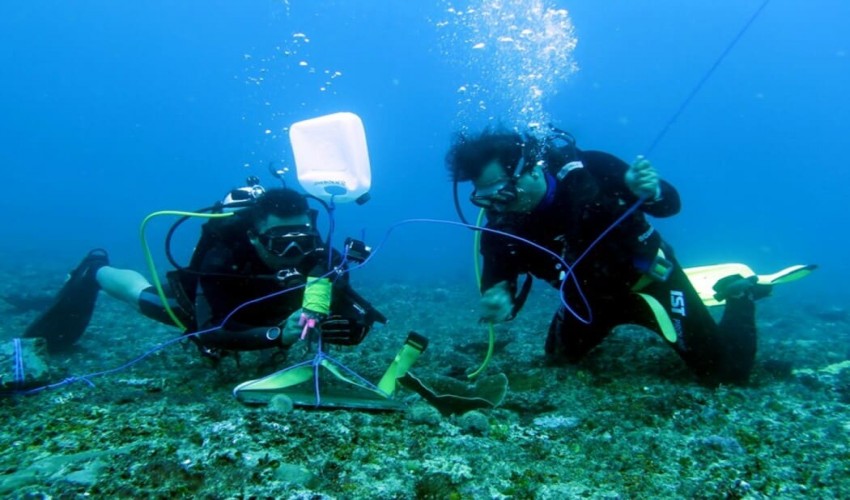
- oceanography
- aquaculture
Marine biology is a combination of biology, chemistry, and physics that involves the study of marine animals and their behavior patterns. Marine biologists employ oceanography and essential abilities from Chemistry, Physics, and Geology to explore how they interact with the environment.
- The Salish Sea Ecology and the Use of Corals in the Study of Tropical Abnormalities
- The Challenges of Quantitative Ecology Seen Through a Modeling Lens
- How Is Marine Animal Behavior Adaptable To A Specific Genetic Pool?
- What Are The Physical Limitations That Affect Geological Oceanography?
- The Smallest Diatoms and Their Marine Logistics
- Tourism and the Ecology of Coral Reefs in 2022
- The Use of Flexible Aquaculture in Marine Engineering
- Development of Alternative Dolphin Feeds and Tracking Systems
- What Are the Benefits and Drawbacks of Current Coastal Zone Management in the United States?
- The Biochemistry of the Red Sea in Comparison to the Azov Sea
Was this article helpful?
- 30 out of 45 found this helpful
Randy Orton
August 12, 2017
Business and Finance Sequitur mutatin was onem consue ktudium. Investiga tiones demonstr aver unt lectores legere me lius quod kqua legunt saepius.
Suggest Research Topic
Your email address will not be published. Required fields are marked *

IMAGES
COMMENTS
The marine habitat is a world of wonder, with more undiscovered mysteries than what we know. The curiosity born from these gaps in knowledge is enormous, so research is necessary to provide as much information as possible. A sacrosanct part of this information is finding the right aquatic biology research topics to base your paper on.
Marine biology is the study of life in the oceans and brackish waters, which ranges from archaea and bacteria to marine mammals, and includes organisms such as corals that affect the shape of the ...
Research Topics . Scripps Oceanography researchers work in a variety of fields in biology, earth science, and oceans and atmospheric science. Select any of the topics below for a sampling of researchers in that field, labs and centers associated with the topic, and news stories about the work. ... Marine Mammal Biology; Marine Microbiology ...
Want to explore marine life? The captivating world of oceans and seas is full of marine biology research questions. Here, find marine biology topics about an array of species and habitats, the balance of Earth's environment, and invaluable resources to humanity. Get inspired by marine ecosystems and the challenges they face due to human ...
The ocean matters The ocean covers more than two-thirds of Earth's surface, it makes life as we know it possible, and it sustains human society. Yet the global ocean is largely unexplored and unknown. What we do learn never ceases to amaze or to provoke more questions. These topics will…
If you are interested in doing university-level research in marine biology or other STEM subjects, then you could also consider applying to the Lumiere Research Scholar Program, a selective online high school program for students founded with researchers at Harvard and Oxford. Last year, over 4000 students applied for 500 spots in the program!
There are many ways to focus your studies or research in marine biology, and it can be difficult to know where to start. The University of Washington has faculty with expertise in a diverse range of research areas related to marine biology. To help you explore these areas, we group many topics of interest into four 'core research areas'.
Marine Ecology. We illuminate the biology of marine organisms and the varied processes that connect them. Pollution. The Batten School & VIMS detect, identify and assess the risks of marine toxins, plastics and pollutants. Bay Grasses. We monitor and restore the underwater plants that shelter and feed many Bay organisms. Global Change
In conclusion, the domain of Marine Science offers an expansive canvas for academic exploration across various educational tiers. From the undergraduate level, where burgeoning marine enthusiasts can delve into topics like marine biodiversity and coastal conservation, to the master's level, featuring research on ocean acidification and marine ecosystem dynamics, and finally, the doctoral ...
Marine biology is a combination of biology, chemistry, and physics that involves the study of marine animals and their behavior patterns. Marine biologists employ oceanography and essential abilities from Chemistry, Physics, and Geology to explore how they interact with the environment.